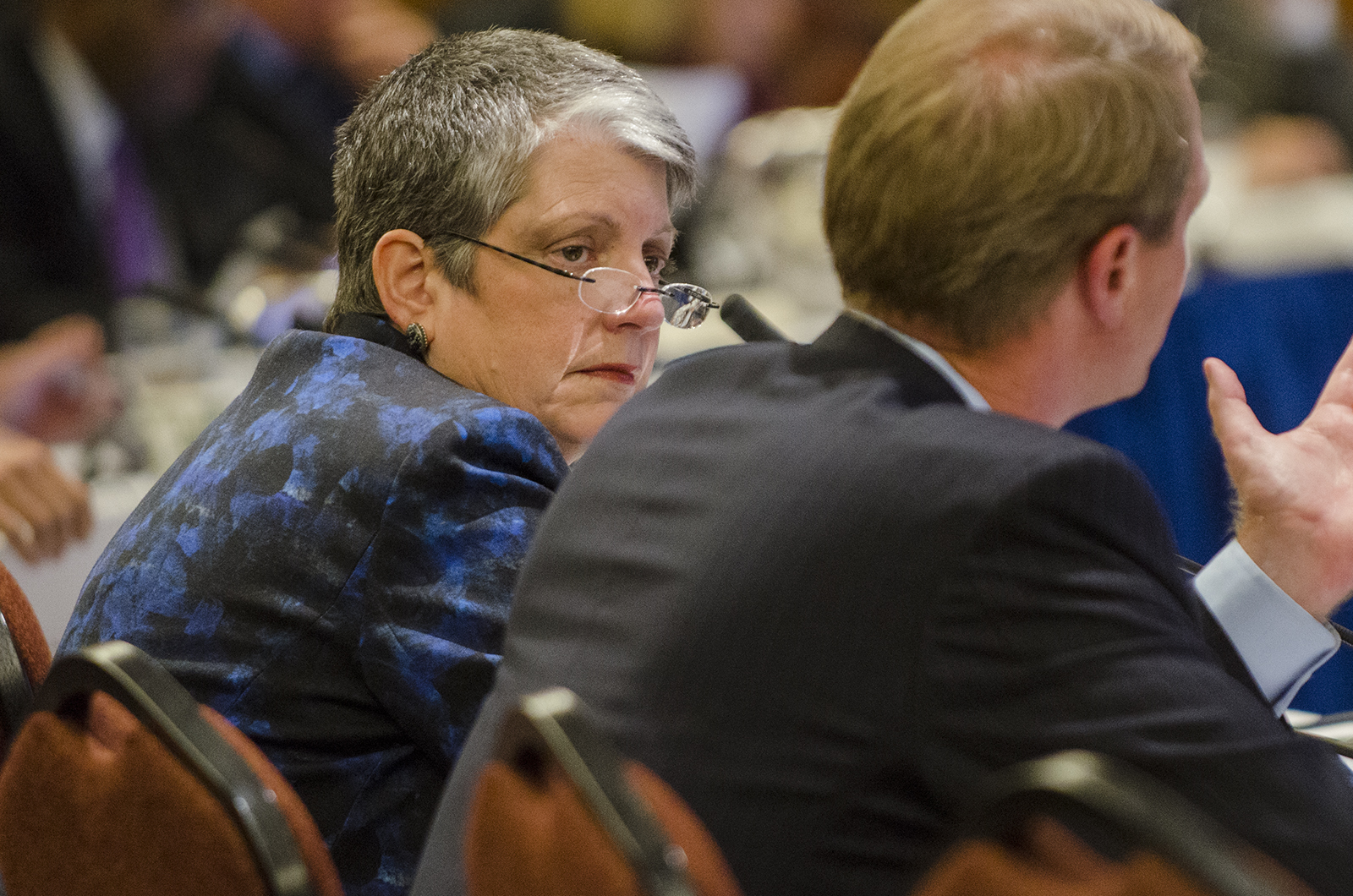Kunal Patel: Napolitano, UC administrators must be more accessible to students

A hot mic caught UC President Janet Napolitano calling a student strip protest “crap” at the Board of Regents meeting this month. After news of her gaffe began to spread, Napolitano apologized to students, saying that she “was caught on the mic with a word that was unfortunate.” (Daniel Alcazar/Daily Bruin)
By Kunal Patel
March 30, 2015 12:00 a.m.
University of California President Janet Napolitano is in quite the predicament.
At the UC Board of Regents meeting this month, student protesters disrupted the regents meeting by stripping, shouting and throwing fake money to decry the tuition hike plan. Before the regents walked out on student protesters, Napolitano offhandedly said “we don’t have to listen to this crap” to another regent.
Despite asking for “empathy and understanding” for the circumstances that led her to make that comment, her evasive apology did little to mend fences with students. There is little empathy to be levied after Napolitano illustrated the sentiment that the regents do not have to listen to student concerns.
What’s troubling about this situation is not Napolitano’s comment per se. It’s that Napolitano spent almost two years building an image as a different type of administrator: understanding and accountable. But her comment revealed that she, like much of the UC administration, is not understanding, accountable or accessible to students in any real way. If Napolitano and the rest of the UC want to slow or stop student protests, they would do well to listen to students in earnest.
Although recent student responses to administrative decisions – including the strip protest that prompted Napolitano’s comment – may seem exaggerated, the administration’s tepid response to student concerns justifies students’ anger and continued protest. While listening to student protests may be upsetting for Napolitano, it is her job to address the concerns of the student body. Unfortunately for her, recent administrative actions and lack of regard for students have only exacerbated students’ concerns about the administration’s lack of accessibility.
The UC administration should realize that by lowering its accessibility to students, it is creating a negative perception among the student body. Therefore, it should create additional avenues for students to get their voices heard, whether that be through increased public comment times at meetings or through other meetings with student groups and student leaders across the UC.
Napolitano’s comment and the lack of accessibility it betrayed are part of a larger pattern of administrators who are perpetually unavailable to the students they’re supposed to be serving.
Earlier this month, UCLA Chancellor Gene Block and his media relations team stonewalled the Daily Bruin’s Editorial Board with changes to his quarterly interview policy because board’s questions were “too specific.” If Block takes issue with addressing specific student concerns that the Editorial Board has, then he should come well-prepared for the interview instead of blocking the board’s access.
Additionally, students have protested the lack of student input for large administrative decisions at the University. When Napolitano was named UC president, students across the UC protested her appointment not only because they felt she was not a good choice but also because they were not consulted. By simply listening to students’ concerns before making major administrative decisions, the administration can adequately address the needs of its students.
Student representation on the UC Board of Regents is another concern for students. Currently, only one student can have a seat on the 26-member Board of Regents. Increased student representation on the Board of Regents would be difficult – it would require an amendment to the California Constitution – and such efforts have not gained significant traction among the regents.
These blocks to student input and access create an atmosphere in which Napolitano’s offhand comment creates real harm. She owes students recompense for her gaffe, but students should also realize that this problem neither begins nor ends with Napolitano.
To get out of the predicament they’ve created for themselves, Napolitano and the UC administration must work to ensure that students are involved in administrative decisions, and that their needs are met.


